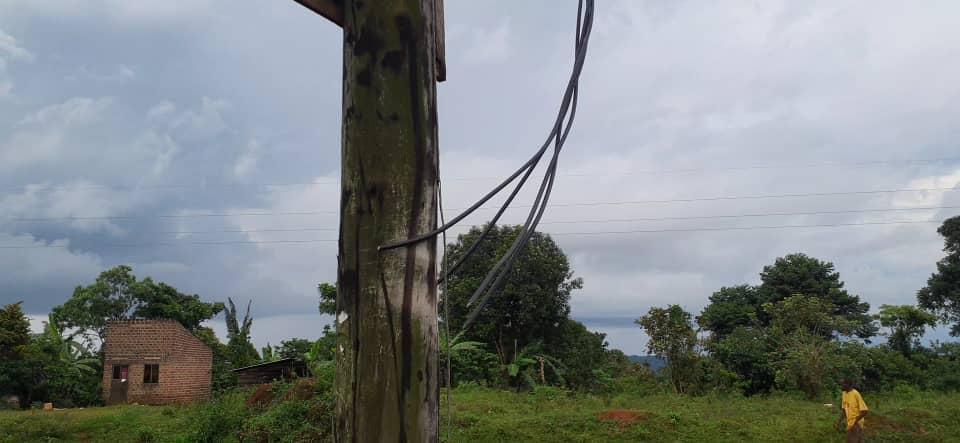Africa-Press – Uganda. Residents and leaders in Ssi Sub-county, Buikwe South, are expressing growing outrage after enduring five months without electricity, following rampant theft of power lines and poles.
The prolonged blackout has disconnected entire villages from the national grid, crippling essential services and devastating livelihoods.
Villages including Namusanga, Buwera, Namukuma, Luka, and Nampaanyi remain littered with dry poles and dangling wires — stark reminders of the region’s deepening power crisis.
Local leaders say the thefts have paralysed critical services such as health centres, maize and coffee mills, and welding workshops.
Small businesses dependent on electricity have either shut down or are operating at great loss, worsening the community’s economic hardships.
Irene Ndagire, Defence Secretary of Luka Village, said the persistent blackout has also triggered a surge in crime, including frequent break-ins and night-time attacks on residents.
“The darkness has made it easy for criminals to operate,” Ndagire said.
Peter Kyazze, a resident of Namukuma, said the outage has left many families struggling to survive.
“Some maize mill owners and welders have shut down their businesses, waiting for UEDCL to restore power. This has left many workers jobless,” Kyazze said.
Some residents suspect insider involvement in the thefts, alleging that employees of the Uganda Electricity Distribution Company Limited (UEDCL) could be complicit.
“They are here within us,” one resident claimed, suggesting the thieves have local connections and knowledge of the power infrastructure.
Great! Here’s a short timeline and an optional side note you can add to the article if you want to present it as a fuller news package:
Timeline of the Buikwe South Power Crisis
December 2024: First reports of stolen power lines and poles in Namusanga and Buwera villages.
January 2025: Blackout extends to Namukuma, Luka, and Nampaanyi as more infrastructure is vandalised.
February 2025: District officials report the thefts to UEDCL and request security intervention.
March 2025: RDC Maj. Gen. David Matovu orders night patrols and roadblocks after suspicions rise about organised gangs using vehicles.
April 2025: Five months on, villages remain without electricity; economic activities crippled; leaders call for military involvement in investigations.
Side Note: The Wider Impact of Rural Electrification Setbacks
Buikwe’s crisis highlights broader vulnerabilities in Uganda’s rural electrification drive.
According to the Ministry of Energy and Mineral Development, vandalism and infrastructure theft cost the government billions of shillings annually, slowing efforts to connect rural communities.
Officials warn that unless local security is strengthened and communities are mobilised to protect public assets, Uganda risks missing key electrification targets outlined in Vision 2040.
Buikwe District Chairman Jimmy Kanaabi confirmed the situation and said insulated wires are the most commonly targeted.
Despite complaints and reports to authorities, he said no meaningful action has yet been taken to restore services.
Maj. Gen. David Matovu, the Resident District Commissioner (RDC) of Buikwe, said a vehicle — reportedly a Toyota Wish — is believed to be used by the culprits.
He has ordered security committees to mount night roadblocks to hunt down the suspects.
“This is not ordinary theft,” Matovu said.
“Cutting and stealing electric wires is an act of rebellion. These people should be arraigned before the court martial because they are fighting the government.”
The Buikwe District Woman Member of Parliament, Diana Mutasingwa, also raised serious concerns, warning that persistent sabotage could derail the government’s rural electrification programme.
“This is no longer just theft; it is sabotage of public infrastructure and a threat to national security,” Mutasingwa said.
She urged locals to embrace community policing by identifying and reporting those behind the thefts.
As the blackout drags on, frustration among Buikwe South residents continues to mount, with many fearing for their safety, livelihoods, and future unless urgent action is taken.
For More News And Analysis About Uganda Follow Africa-Press






